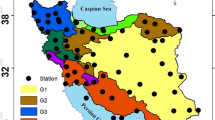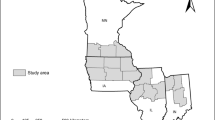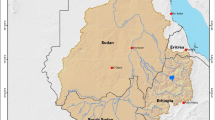Abstract
As crop productivity is greatly influenced by weather conditions, many attempts have been made to estimate crop yields using meteorological data and have achieved great progress with the development of machine learning. However, most yield prediction models are developed based on observational data, and the utilization of climate model output in yield prediction has been addressed in very few studies. In this study, we estimate rice yields in South Korea using the meteorological variables provided by ERA5 reanalysis data (ERA-O) and its dynamically downscaled data (ERA-DS). After ERA-O and ERA-DS are validated against observations (OBS), two different machine learning models, Support Vector Machine (SVM) and Long Short-Term Memory (LSTM), are trained with different combinations of eight meteorological variables (mean temperature, maximum temperature, minimum temperature, precipitation, diurnal temperature range, solar irradiance, mean wind speed, and relative humidity) obtained from OBS, ERA-O, and ERA-DS at weekly and monthly timescales from May to September. Regardless of the model type and the source of the input data, training a model with weekly datasets leads to better yield estimates compared to monthly datasets. LSTM generally outperforms SVM, especially when the model is trained with ERA-DS data at a weekly timescale. The best yield estimates are produced by the LSTM model trained with all eight variables at a weekly timescale. Altogether this study shows the significance of high spatial and temporal resolution of input meteorological data in yield prediction, which can also serve to substantiate the added value of dynamical downscaling.





Similar content being viewed by others
Data Availability
The data that support the findings of this study are available from the corresponding author upon reasonable request.
References
Abrougui K, Gabsi K, Mercatoris B, Khemis C, Amami R, Chehaibi S (2019) Prediction of organic potato yield using tillage systems and soil properties by artificial neural network (ANN) and multiple linear regressions (MLR). Soil Till Res 190:202–208. https://doi.org/10.1016/j.still.2019.01.011
Alexandrov VA, Hoogenboom G (2000) The impact of climate variability and change on crop yield in Bulgaria. Agric For Meteorol 104(4):315–327. https://doi.org/10.1016/S0168-1923(00)00166-0
Alexandrov VA, Hoogenboom G (2001) Climate variation and crop production in Georgia, USA, during the twentieth century. Clim Res 17(1):33–43. https://doi.org/10.3354/cr017033
Auffhammer M, Ramanathan V, Vincent JR (2012) Climate change, the monsoon, and rice yield in India. Clim Chang 111(2):411–424. https://doi.org/10.1007/s10584-011-0208-4
Cao J, Zhang Z, Tao F, Zhang L, Luo Y, Zhang J et al (2021) Integrating multi-source data for rice yield prediction across china using machine learning and deep learning approaches. Agric For Meteorol 297:108275. https://doi.org/10.1016/j.agrformet.2020.108275
Chen H, Wu W, Liu HB (2016) Assessing the relative importance of climate variables to rice yield variation using support vector machines. Theor Appl Climatol 126(1):105–111. https://doi.org/10.1007/s00704-015-1559-y
Chen K, O’Leary RA, Evans FH (2019) A simple and parsimonious generalised additive model for predicting wheat yield in a decision support tool. Agric Syst 173:140–150. https://doi.org/10.1016/j.agsy.2019.02.009
Cho S, Youn Y, Kim S, Jeong Y, Kim G, Kang J et al (2021) A comparative evaluation of multiple meteorological datasets for the rice yield prediction at the county level in South Korea. Korean J Remote Sens 37(2):337–357. https://doi.org/10.7780/kjrs.2021.37.2.12
Clauss K, Ottinger M, Leinenkugel P, Kuenzer C (2018) Estimating rice production in the Mekong Delta, Vietnam, utilizing time series of Sentinel-1 SAR data. Int J Appl Earth Obs Geoinf 73:574–585
Crane-Droesch A (2018) Machine learning methods for crop yield prediction and climate change impact assessment in agriculture. Environ Res Lett 13(11):114003. https://doi.org/10.1088/1748-9326/aae159
Das B, Nair B, Reddy VK, Venkatesh P (2018) Evaluation of multiple linear, neural network and penalised regression models for prediction of rice yield based on weather parameters for west coast of India. Int J Biometeorol 62(10):1809–1822. https://doi.org/10.1007/s00484-018-1583-6
Gandhi N, Armstrong LJ, Petkar O, Tripathy AK (2016) Rice crop yield prediction in India using support vector machines. In 2016 13th International Joint Conference on Computer Science and Software Engineering (JCSSE) (pp. 1–5). IEEE. https://doi.org/10.1109/JCSSE.2016.7748856
Gardiner B, Berry P, Moulia B (2016) Wind impacts on plant growth, mechanics and damage. Plant Sci 245:94–118. https://doi.org/10.1016/j.plantsci.2016.01.006
Garg B, Beg MS, Ansari AQ (2013) Fuzzy time series model to forecast rice production. 2013 IEEE International Conference on Fuzzy Systems (FUZZ-IEEE), Hyderabad, India, 2013, pp. 1–8. https://doi.org/10.1109/FUZZIEEE.2013.6622509
Hersbach H, Bell B, Berrisford P, Hirahara S, Horányi A, Muñoz-Sabater J et al (2020) The ERA5 global reanalysis. Q J R Meteorol Soc 146(730):1999–2049. https://doi.org/10.1002/qj.3803
Hong SY, Hur J, Ahn JB, Lee JM, Min BK, Lee CK et al (2012) Estimating rice yield using MODIS NDVI and meteorological data in Korea. Korean J Remote Sens 28(5):509–520. https://doi.org/10.7780/kjrs.2012.28.5.4
Hu Q, Buyanovsky G (2003) Climate effects on corn yield in Missouri. J Appl Meteorol Climatol 42(11):1626–1635. https://doi.org/10.1175/1520-0450(2003)042%3c1626:CEOCYI%3e2.0.CO;2
Im ES, Ha S, Qiu L, Hur J, Jo S, Shim KM (2021) An evaluation of temperature-based agricultural indices over Korea from the high-resolution WRF simulation. Front Earth Sci 9:656787. https://doi.org/10.3389/feart.2021.656787
Jaikla R, Auephanwiriyakul S, Jintrawet A (2008) Rice yield prediction using a support vector regression method. In 2008 5th International Conference on Electrical Engineering/Electronics, Computer, Telecommunications and Information Technology (Vol. 1, pp. 29–32). IEEE. https://doi.org/10.1109/ECTICON.2008.4600365
Jeong O, Park HS, Baek MK, Kim WJ, Lee GM, Lee CM et al (2021) Review of rice in Korea: current status, future prospects, and comparisons with rice in other countries. J Crop Sci Biotechnol 24(1):1–11. https://doi.org/10.1007/s12892-020-00053-6
Jeong S, Ko J, Yeom JM (2018) Nationwide projection of rice yield using a crop model integrated with geostationary satellite imagery: a case study in South Korea. Remote Sens 10(10):1665. https://doi.org/10.3390/rs10101665
Ji B, Sun Y, Yang S, Wan J (2007) Artificial neural networks for rice yield prediction in mountainous regions. J Agric Sci 145(3):249–261. https://doi.org/10.1017/S0021859606006691
Joshi VR, Kazula MJ, Coulter JA, Naeve SL, Garcia y Garcia A (2021) In-season weather data provide reliable yield estimates of maize and soybean in the US central Corn Belt. Int J Biometeorol 65(4):489–502. https://doi.org/10.1007/s00484-020-02039-z
Kashiwagi T, Ishimaru K (2004) Identification and functional analysis of a locus for improvement of lodging resistance in rice. Plant Physiol 134(2):676–683. https://doi.org/10.1104/pp.103.029355
Kaul M, Hill RL, Walthall C (2005) Artificial neural networks for corn and soybean yield prediction. Agric Syst 85(1):1–18. https://doi.org/10.1016/j.agsy.2004.07.009
Kittichotsatsawat Y, Tippayawong N, Tippayawong KY (2022) Prediction of arabica coffee production using artificial neural network and multiple linear regression techniques. Sci Rep 12(1):1–14. https://doi.org/10.1038/s41598-022-18635-5
Kogan F, Kussul NN, Adamenko TI, Skakun SV, Kravchenko AN, Krivobok AA et al (2013) Winter wheat yield forecasting: A comparative analysis of results of regression and biophysical models. J Autom Inf Sci 45(6):68–81. https://doi.org/10.1615/JAutomatInfScien.v45.i6.70
Kouadio L, Byrareddy VM, Sawadogo A, Newlands NK (2021) Probabilistic yield forecasting of robusta coffee at the farm scale using agroclimatic and remote sensing derived indices. Agric for Meteorol 306:108449
Kouadio L, Newlands NK, Davidson A, Zhang Y, Chipanshi A (2014) Assessing the performance of MODIS NDVI and EVI for seasonal crop yield forecasting at the ecodistrict scale. Remote Sens 6(10):10193–10214
Lobell DB (2007) Changes in diurnal temperature range and national cereal yields. Agric for Meteorol 145(3–4):229–238. https://doi.org/10.1016/j.agrformet.2007.05.002
Lobell DB, Asseng S (2017) Comparing estimates of climate change impacts from process-based and statistical crop models. Environ Res Lett 12(1):015001. https://doi.org/10.1088/1748-9326/aa518a
Lobell DB, Burke MB (2010) On the use of statistical models to predict crop yield responses to climate change. Agric For Meteorol 150(11):1443–1452. https://doi.org/10.1016/j.agrformet.2010.07.008
Mathieu J, Aires F (2016) Statistical weather-impact models: an application of neural networks and mixed effects for corn production over the United States. J Appl Meteorol Climatol 55(11):2509–2527. https://doi.org/10.1175/JAMC-D-16-0055.1
Matsumura K, Gaitan CF, Sugimoto K, Cannon AJ, Hsieh WW (2015) Maize yield forecasting by linear regression and artificial neural networks in Jilin. China J Agric Sci 153(3):399–410. https://doi.org/10.1017/S0021859614000392
Ministry of Agriculture, Food and Rural Affairs (MAFRA), Korea Rural Community Corporation (KRC) (2022) Statistical yearbook of land and water development for agriculture, South Korea
Mkhabela MS, Bullock P, Raj S, Wang S, Yang Y (2011) Crop yield forecasting on the Canadian Prairies using MODIS NDVI data. Agric For Meteorol 151(3):385–393
Morell FJ, Yang HS, Cassman KG, Van Wart J, Elmore RW, Licht M et al (2016) Can crop simulation models be used to predict local to regional maize yields and total production in the US Corn Belt? Field Crop Res 192:1–12. https://doi.org/10.1016/j.fcr.2016.04.004
Moriasi DN, Arnold JG, Van Liew MW, Bingner RL, Harmel RD, Veith TL (2007) Model evaluation guidelines for systematic quantification of accuracy in watershed simulations. Trans ASABE 50(3):885–900. https://doi.org/10.13031/2013.23153
Na SI, Hong SY, Kim YH, Lee KD, Jang SY (2013) Prediction of rice yield in Korea using paddy rice NPP index-application of MODIS data and CASA model. Korean J Remote Sens 29(5):461–476. https://doi.org/10.7780/kjrs.2013.29.5.2
Na SI, Park JH, Park JK (2012) Development of Korean paddy rice yield prediction model (KRPM) using meteorological element and MODIS NDVI. J Korean Soc Agric Eng 54(3):141–148. https://doi.org/10.5389/KSAE.2012.54.3.141
Oguntunde PG, Lischeid G, Dietrich O (2018) Relationship between rice yield and climate variables in southwest Nigeria using multiple linear regression and support vector machine analysis. Int J Biometeorol 62(3):459–469. https://doi.org/10.1007/s00484-017-1454-6
Onwuchekwa-Henry CB, Ogtrop FV, Roche R, Tan DK (2022) Model for Predicting Rice Yield from Reflectance Index and Weather Variables in Lowland Rice Fields. Agriculture 12(2):130. https://doi.org/10.3390/agriculture12020130
Oses N, Azpiroz I, Marchi S, Guidotti D, Quartulli M, Olaizola GI (2020) Analysis of copernicus’ era5 climate reanalysis data as a replacement for weather station temperature measurements in machine learning models for olive phenology phase prediction. Sensors 20(21):6381. https://doi.org/10.3390/s20216381
Oyoshi K, Tomiyama N, Okumura T, Sobue S, Sato J (2016) Mapping rice-planted areas using time-series synthetic aperture radar data for the Asia-RiCE activity. Paddy Water Environ, 14:463–472
Peng B, Guan K, Pan M, Li Y (2018) Benefits of seasonal climate prediction and satellite data for forecasting US maize yield. Geophys Res Lett 45(18):9662–9671. https://doi.org/10.1029/2018GL079291
Prabhjyot-Kaur SSS, Dhillo BS, Sing H (2021) Rice yield variability in Punjab: an overview of five decades. Paddy and Water Environ 19(4):673–681. https://doi.org/10.1007/s10333-021-00866-3
Qiu L, Im ES, Hur J, Shim KM (2020) Added value of very high resolution climate simulations over South Korea using WRF modeling system. Clim Dyn 54(1):173–189. https://doi.org/10.1007/s00382-019-04992-x
Rajkumara S (2008) Lodging in cereals-a review. Agric Rev 29(1):55–60
Ray DK, Gerber JS, MacDonald GK, West PC (2015) Climate variation explains a third of global crop yield variability. Nat Commun 6(1):1–9. https://doi.org/10.1038/ncomms6989
Rodríguez-Puebla C, Ayuso SM, Frias MD, Garcia-Casado LA (2007) Effects of climate variation on winter cereal production in Spain. Clim Res 34(3):223–232. https://doi.org/10.3354/cr00700
Su YX, Xu H, Yan LJ (2017) Support vector machine-based open crop model (SBOCM): Case of rice production in China. Saudi J Biol Sci 24(3):537–547. https://doi.org/10.1016/j.sjbs.2017.01.024
Sun J, Di L, Sun Z, Shen Y, Lai Z (2019) County-level soybean yield prediction using deep CNN-LSTM model. Sensors 19(20):4363. https://doi.org/10.3390/s19204363
Tack J, Barkley A, Nalley LL (2015) Effect of warming temperatures on US wheat yields. Proc Natl Acad Sci 112(22):6931–6936. https://doi.org/10.1073/pnas.1415181112
Tao F, Zhang Z, Xiao D, Zhang S, Rötter RP, Shi W et al (2014) Responses of wheat growth and yield to climate change in different climate zones of China, 1981–2009. Agric for Meteorol 189:91–104. https://doi.org/10.1016/j.agrformet.2014.01.013
Teasdale JR, Cavigelli MA (2017) Meteorological fluctuations define long-term crop yield patterns in conventional and organic production systems. Sci Rep 7(1):1–10. https://doi.org/10.1038/s41598-017-00775-8
Tian H, Wang P, Tansey K, Zhang J, Zhang S, Li H (2021) An LSTM neural network for improving wheat yield estimates by integrating remote sensing data and meteorological data in the Guanzhong Plain. PR China. Agric For Meteorol 310:108629. https://doi.org/10.1016/j.agrformet.2021.108629
Van Gardingen P, Grace J (1991) Plants and wind. In Advances in Botanical Research (Vol. 18, pp. 189–253). Academic Press. https://doi.org/10.1016/S0065-2296(08)60023-3
Van Wart J, Kersebaum KC, Peng S, Milner M, Cassman KG (2013) Estimating crop yield potential at regional to national scales. Field Crop Res 143:34–43. https://doi.org/10.1016/j.fcr.2012.11.018
Verón SR, De Abelleyra D, Lobell DB (2015) Impacts of precipitation and temperature on crop yields in the Pampas. Clim Chang 130(2):235–245. https://doi.org/10.1007/s10584-015-1350-1
Yun JI (2003) Predicting regional rice production in South Korea using spatial data and crop-growth modeling. Agric Syst 77(1):23–38. https://doi.org/10.1016/S0308-521X(02)00084-7
Zaefizadeh M, Jalili A, Khayatnezhad M, Gholamin R, Mokhtari T (2011) Comparison of multiple linear regressions (MLR) and artificial neural network (ANN) in predicting the yield using its components in the hulless barley. Adv Environ Biol 109–114
Zeybek M (2018) Nash-sutcliffe efficiency approach for quality improvement. J Applied Math Comput 2(11):496–503. https://doi.org/10.26855/jamc.2018.11.001
Zhang T, Zhu J, Wassmann R (2010) Responses of rice yields to recent climate change in China: an empirical assessment based on long-term observations at different spatial scales (1981–2005). Agric for Meteorol 150(7–8):1128–1137. https://doi.org/10.1016/j.agrformet.2010.04.013
Acknowledgements
This study was carried out with the support of the “Research Program for Agricultural Science & Technology Development (Project No. PJ014882)”, National Institute of Agricultural Sciences, Rural Development Administration, Republic of Korea. We would thank Prof. Axel Garcia y Garcia and Dr. Vijaya Raj Joshi who provided us the R code used for developing and evaluating the statistical models presented in Joshi et al. (2020). We would also like to express our gratitude to Prof. Kwon Hyun-Han for discussing the interpretation of the statistical analysis with us.
Author information
Authors and Affiliations
Corresponding author
Supplementary Information
Below is the link to the electronic supplementary material.
Rights and permissions
Springer Nature or its licensor (e.g. a society or other partner) holds exclusive rights to this article under a publishing agreement with the author(s) or other rightsholder(s); author self-archiving of the accepted manuscript version of this article is solely governed by the terms of such publishing agreement and applicable law.
About this article
Cite this article
Ha, S., Kim, YT., Im, ES. et al. Impacts of meteorological variables and machine learning algorithms on rice yield prediction in Korea. Int J Biometeorol 67, 1825–1838 (2023). https://doi.org/10.1007/s00484-023-02544-x
Received:
Revised:
Accepted:
Published:
Issue Date:
DOI: https://doi.org/10.1007/s00484-023-02544-x




